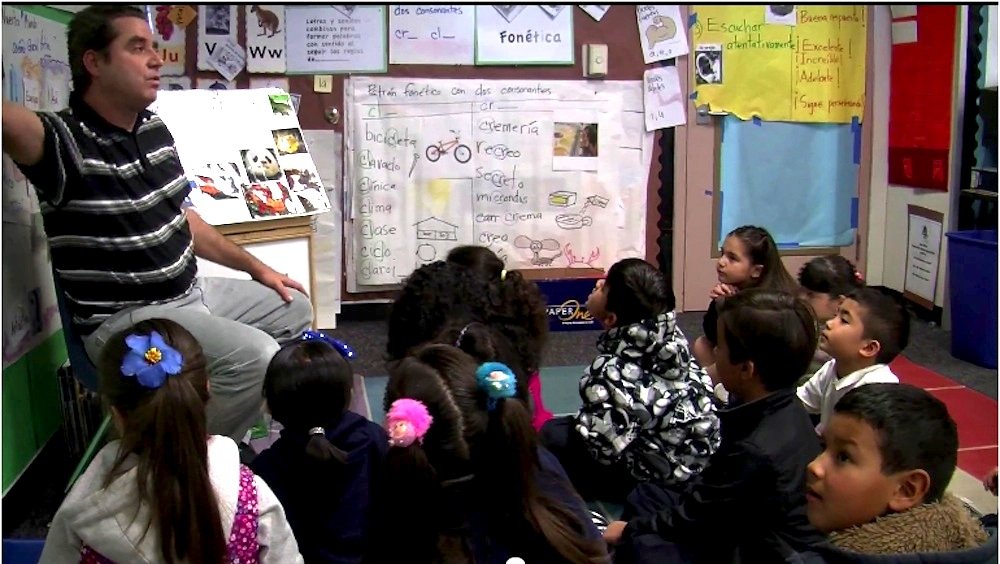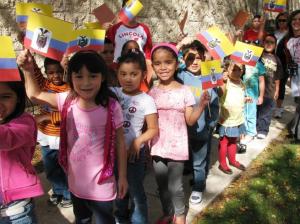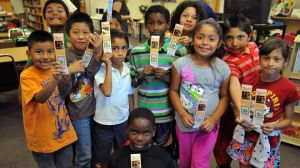Our Schools Need Latino Teachers
Feb 27, 2015
Posted in Arts and Culture, Commentary, Education/Schools/Youth, Equal Rights/Equity, Immigrant Rights, Labor

By Francisco Ortiz, Kimberly Mayfield Lynch and Kitty Kelly Epstein
Marisol, a very effective Bay Area high school teacher, says that she never had a Latino teacher until she was in the 10th grade.
“Having a Latino teacher made me much more positive about education and caused me to think about teaching,” she said.

Marisol’s experience is not unusual. Fifty-three percent of students and only 18 percent percent of teachers in California public schools are Latino. There are schools in the Bay Area that have hundreds of Latino children and not a single Latino teacher.
Currently, one of the authors of this article, Mr. Ortiz, is the only Spanish-speaking Latino teacher for the entire upper-elementary grades (4-6) at his school.
He says, “I am able to effectively communicate with the newcomer students in my classroom, as well as other newcomer students in grades 4-6, something which may not always be possible for monolingual English speaking teachers.”
“Although I teach sixth grade,” he continues, “parents from other classrooms say they hope that their children will be my students in the future. Kids from grades 2-5 often see me in the halls and express their excitement to be in my classroom.”

Latino students want to succeed. Whether it’s cultural capital, linguistic capital or a combination of both that allow Latino students to feel more empowered and confident through having Latino teachers, this ever growing and crucially important resource should not be ignored, especially since the Latino population is the fastest growing ethnic group in California’s schools, he said.
Asian, white and Black students also need Latino teachers to share their language, along with their cultural and global wisdom.
Some authors treat the lack of Latino teachers as a problem of recruitment, and some have even argued that Latinos are not interested in becoming teachers.


In reality there are many barriers that stand in the way of Latinos earning the teaching credential. Standardized tests continue to be a significant barrier for Latinos entering the teaching profession.
Due to the racial wealth gap, many Latino families are challenged by the high fees for the assessments and by the requirement of many programs that candidates work for free as a student teacher.
Another barrier for Latinos who have English as a second language is the writing section of the standardized assessment. Test takers are required to write all responses in English.
Although Spanish is the first language for 40 percent of California students, there is absolutely no credit given for Spanish fluency in fulfilling the requirements for credentialing.
Additionally, traditional recruitment strategies are often not effective for recruiting Latinos. Recruitment of college graduates and career-changers through community-based organizations is more effective than the traditional bureaucratic routes.
In our view the recruitment of teachers of color is a far better way to improve American schools and stabilize the teaching force than the over-testing of everybody, which is currently the favorite project of many policy-makers.

Kimberly Mayfield-Lynch is chair of Black Women Organized for Political Action and chair of the Education Department at Holy Names University.
Francisco Ortiz is a Bay Area teacher and a graduate student researching issues of Latino teacher recruitment.
Kitty Kelly Epstein hosts Education Today on KPFA – FM and writes on issues involving education and urban policy. (A Different View of Urban Schools (2012) Peter Lang).